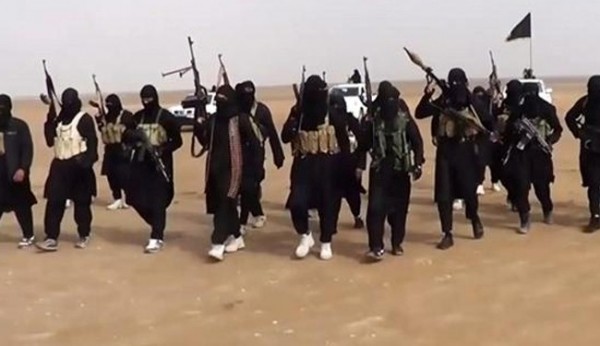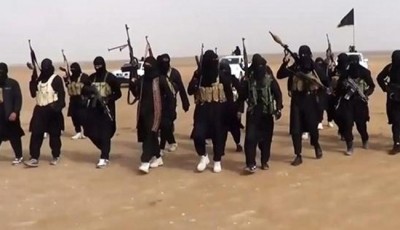From the Gulf, the Maghreb and everywhere in between, Arab fighters have answered the Islamic State’s clarion call to arms. Diminutive Tunisia alone is estimated to have contributed 2,400 young men to the Jihadist cause. There are reportedly a further 8,000 men detained by authorities who are trying to leave for the battlefields of the east.
Something is pulling these angry men to kill and be killed in the wastelands of Syria and Iraq, something is asking them to commit to a form of Islam unrecognisable to their parents or their communities and something is driving them to commit acts of horror such as that perpetrated upon Foley.
In Tunis itself, in a hilltop café on the outskirts of the capital, Mohamed Iqbel Ben Rejeb leans in. The two men at the table next to us seem to be unusally interested in what he’s saying. Ben Rejeb has been told by two separate sources that his phone is tapped. He’s getting used to being followed.
Ben Rejeb has cause to worry. His charity, Rescue Association of Tunisians Trapped Abroad, while opposed to any form of extremism, has found itself connecting many of the young Tunisians fighting in IS who want to return home, and the families and authorities awaiting their arrival and inevitable arrest.
Like everyone, Ben Rejeb has seen the video of Foley’s decapitation. “Young men are going to see that video and they’re going to join Daish, [the Kurdish and Arabic term for Islamic State] because of it. Not because it’s James Foley being killed, but because it’s an American.”
Ben Rejeb is clear, “Look, we watch that video and we see one human being killing another. Daish watch that video and they’re seeing a Muslim killing an atheist.”
Every day, disaffected and angry young men are arriving in Syria and Iraq to fight for IS, drawn there by the group’s strident interpretation of Islam, the long cherished dream of an Islamic Caliphate and the promise of a resolute and final response to what they see as the imposition of Israel on the Muslim world and America’s continued support for it.
“Daish is founded on the principal of freeing Palestine. To do that, they they must first make themselves and their state pure,” Ben Rejeb noted.
Recent events in Gaza – and their monopoly of the mainstream media narrative – are only exacerbating the stridency of that goal.
“It started around 2011,” Dr Peter Neumann, Director of the International Centre for the Study of Radicalisation in London told Newsweek. “The Arab Spring created instability and the Syrian revolution created conflict. This is what the recruiters prey on.”
Ben Rejeb is more specific: “In 2011, [after the revolutions] they released the Jihadists from prison. These are the same people who are now fighting in Syria.”
According to the UN, more than 191,000 people have been killed in the vicious civil war that has raged across Syria since the Arab Spring turned to a permanent winter in 2011. Syria is a country numbed to and by the horror of war.
“The Islamic State is trying to recreate the conditions of a 7th century Arabia. From the perspective of the 21st century some of that can be shocking, but it’s not so much that they’re killing people, as that they’re killing the right people,” Neumann told Newsweek.
“These are punishments that are meted out in Saudi Arabia on a monthly basis, but in Iraq and Syria, engulfed as they are in an incredibly sectarian conflict, people use these punishments to serve different objectives,” he continued.
In Foley’s case, that objective was to deliver a message. “The beheading of James Foley was intended to both show the US’s weakness, and to show that the IS is the one credible jihadist organisation fighting against the United States.” Firas Abi Ali, a Middle East analyst at IHS Country Risk toldNewsweek.
“Look, let’s be clear.” Ben Rejeb continued. “It’s the US that supports Israel and it was the US that destroyed Iraq. There is blame here, but it’s blame that should be aimed at the US Government not its people . . . However, the imams and sheiks who work with Daish are using that. They’re using it to brainwash the young.”
Against this background, it is not difficult to see how the US bombing of IS positions in Mosul can work towards the jihadists’ ends.
While many observers have pointed towards rising unemployment amongst the young and a lack of opportunities as key recruiting factors for Isis, Ben Rejeb isn’t so sure. “On average, they’re aged between 18 and 27, but they’re from all classes. It isn’t just the poor. There’s a misconception that Daish is made up of the uneducated, but that’s totally wrong. We’re seeing a lot of university graduates going, particularly scientists, for some reason. I suppose they’re attracted by the clarity.”
Mahfoud Balti’s son, Zouheir, was 21 when he left the family home in the suburbs of Tunis for Syria in 2012. He was studying for his baccalaureate in IT at the time. “He was normal. He wasn’t especially interested in religion or politics. He stayed home during the 2011 revolution. One day, December 19th, 2012, he just said he was going to Syria and he left. He never told me why.
“The young men go because of what they see in Iraq, in Syria, in Palestine. The preachers use this. It’s the same for all of them.”
Perhaps worried about reprisals upon Zouheir’s return, Mahfoud was eager to stress that his son was not involved with any militant groups.
“These young men, they will come back, they will be arrested and brutalised even further. The government here will confirm that everything that was said about them is correct, and then what? What about those who first radicalised them? Will they be held accountable? Probably not.”
It’s a theme picked up by Abdullah Salem Attoui, an imam from the isle of Djerba and General Secretary of the imams’ union. “Beheading the American journalist was a stab in the Muslims’ hearts. We are sorry that it was done in the name of Islam.
“Unfortunately, some preachers need to take responsibility for this, as there are sadly some who are spreading this violence and terrorist culture within the Muslim youth.”
In Tunis, dusk has fallen and Mohamed Iqbel Ben Rejeb walks slowly down a quiet side street, now far away from the attentive ears of the authorities. The scent of jasmine fills the air as bats flit through the fading light.
“People are sick of war. Nobody wants to watch James Foley get killed. Daish aren’t just a threat to the Americans, they’re a threat to everyone. It’s just human beings killing other human beings. It’s nothing to do with Islam. Daish are death incarnate.”
Newsweek



Leave a Reply
You must be logged in to post a comment.